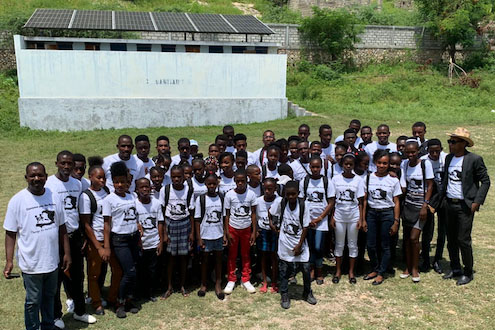 Sarah McKee, HDFS doctoral student, received the Outstanding Student Abstract Award for her abstract, “Pilot Testing the Wellness School Assessment Tool for the Whole School, Whole Community, Whole Child Model” at the American Public Health Association. This project was in collaboration with Professor Marlene Schwartz.
Sarah McKee, HDFS doctoral student, received the Outstanding Student Abstract Award for her abstract, “Pilot Testing the Wellness School Assessment Tool for the Whole School, Whole Community, Whole Child Model” at the American Public Health Association. This project was in collaboration with Professor Marlene Schwartz.
Students
Undergraduate Student Starts Non-Profit
 Seliana Seradieu (an HDFS senior) and her sister, Smana, started a non-profit agency. Change for Haitian Youth is a New York based 501(c)(3) operating in Haiti, whose mission is to improve the lives of Haitian students with a main focus on education. Seliana and Smana were both born and raised in Haiti and wanted to find a way to combine their love for their country and their dedication to the advancement of education, and this organization was their way of doing so! They hope that by providing students with resources such as English and computer courses, they can provide them with the confidence to pursue opportunities that will impact their lives.
Seliana Seradieu (an HDFS senior) and her sister, Smana, started a non-profit agency. Change for Haitian Youth is a New York based 501(c)(3) operating in Haiti, whose mission is to improve the lives of Haitian students with a main focus on education. Seliana and Smana were both born and raised in Haiti and wanted to find a way to combine their love for their country and their dedication to the advancement of education, and this organization was their way of doing so! They hope that by providing students with resources such as English and computer courses, they can provide them with the confidence to pursue opportunities that will impact their lives.
Sumbleen Ali will serve on President’s Council on Race & Diversity
 HDFS doctoral student Sumbleen Ali was selected from a pool of 97 applicants, to serve on the President’s Council on Race and Diversity.
HDFS doctoral student Sumbleen Ali was selected from a pool of 97 applicants, to serve on the President’s Council on Race and Diversity.
HDFS faculty & grad students will present at NCFR conference
Ten HDFS faculty and five HDFS graduate students will present at the 2019 NCFR Annual Conference in Fort Worth, TX, on November 20-23, 2019. See attached list of those presenting.
Ellen Pudney’s poster wins second place at InCHIP Poster Competition
 Ellen Pudney, HDFS doctoral student, won second place poster at the InCHIP Poster Competition for her poster, “A mixed methods analysis examining differential patterns of long-term distress from weight stigma.” HDFS Professor Rebecca Puhl was a co-author.
Ellen Pudney, HDFS doctoral student, won second place poster at the InCHIP Poster Competition for her poster, “A mixed methods analysis examining differential patterns of long-term distress from weight stigma.” HDFS Professor Rebecca Puhl was a co-author.
Debra Tomasino receives LeadingAge Student Full Scholarship
 Graduate student Debra Fortune Tomasino received the LeadingAge Student Full Scholarship to attend the Annual Meeting & EXPO in San Diego on October 26-30, 2019.
Graduate student Debra Fortune Tomasino received the LeadingAge Student Full Scholarship to attend the Annual Meeting & EXPO in San Diego on October 26-30, 2019.
Kate Dibble accepted for a postdoctoral fellowship
 Congratulations to Kate Dibble (current doctoral student), who was recently accepted for a postdoctoral fellowship into Johns Hopkins Bloomberg School of Public Health in cancer epidemiology, prevention, and control starting in September 2020.
Congratulations to Kate Dibble (current doctoral student), who was recently accepted for a postdoctoral fellowship into Johns Hopkins Bloomberg School of Public Health in cancer epidemiology, prevention, and control starting in September 2020.
HDFS faculty & grad students will present at APA conference
One HDFS faculty and four HDFS graduate students will give presentations at the APA (American Psychological Association) 2019 convention, August 8-11, in Chicago, IL. See attached list of those presenting.
Blog by Sam Lawrence posted on NEAG School of Edu website
 Graduate student Samantha Lawrence’s blog entitled, Challenging the stigma of community college students and alumni was posted on the NEAG School of Education website. Read the blog here.
Graduate student Samantha Lawrence’s blog entitled, Challenging the stigma of community college students and alumni was posted on the NEAG School of Education website. Read the blog here.
Student Rachel Nadell was featured in UConn Today article
HDFS undergraduate student Rachel Nadell, president of UConn’s Unified Theater chapter, was featured in an article about the STAAR program at UConn. Read the article here.